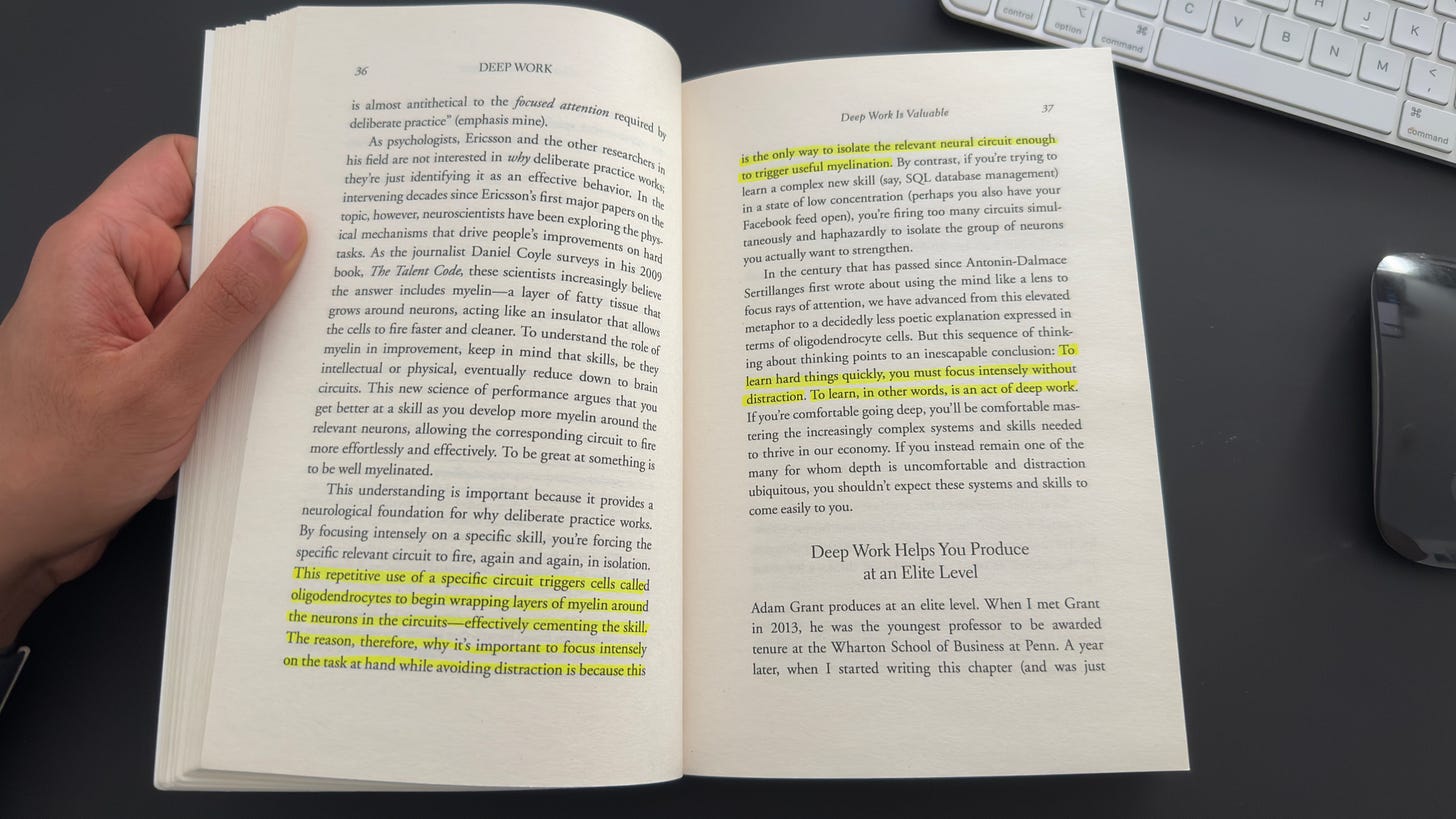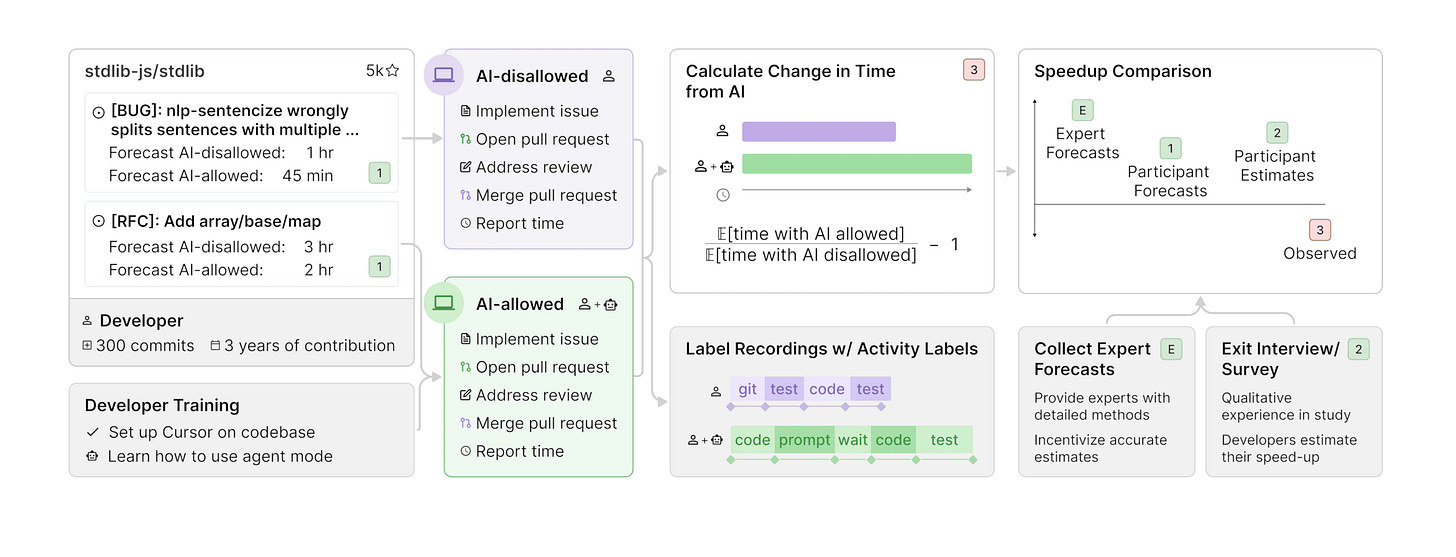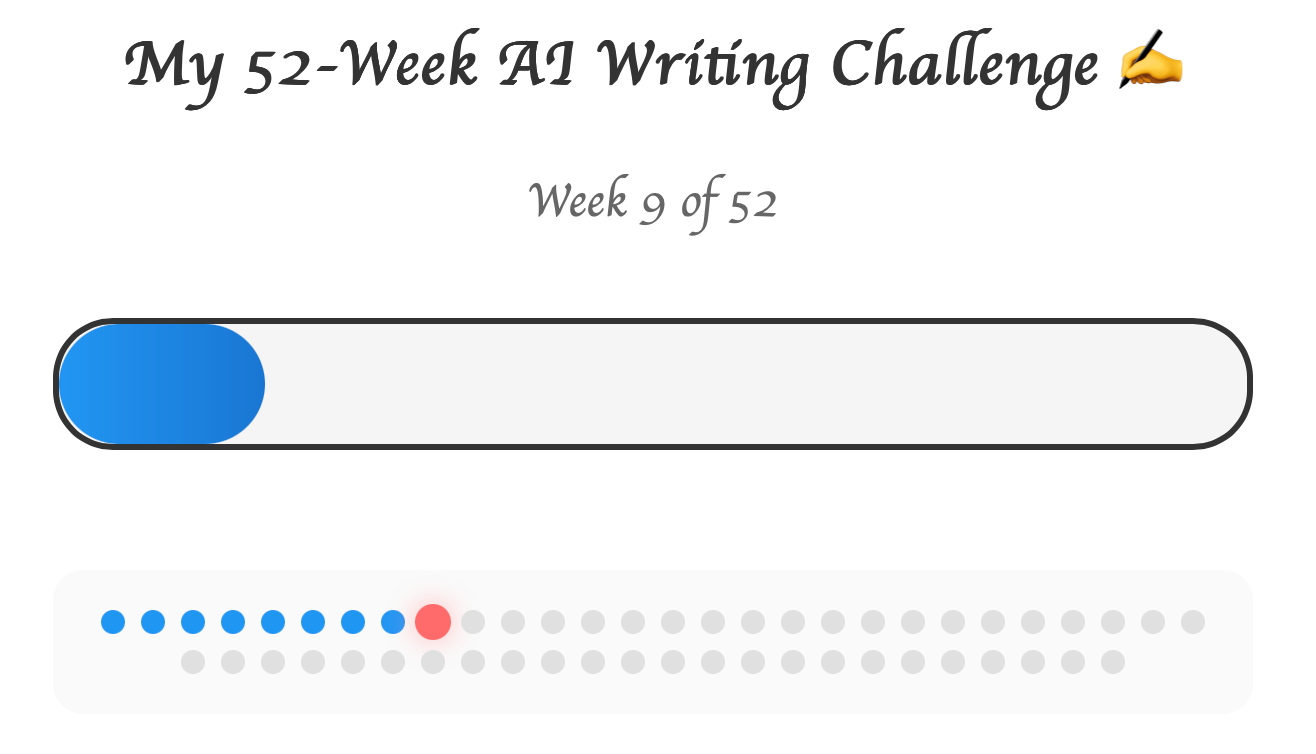The AI Productivity paradox: why working with AI makes me slower
New evidence confirms what many of us suspected but couldn't articulate about our AI workflows
So... here's something that's been bugging me for a while. You know that feeling when you're deep in an AI chat cycle, you feel like making progress but a bit as fast as you expected.
Turns out, we're not imagining it.
A new study just dropped that talks more about AI productivity. When experienced developers use AI tools, they take 19% LONGER to finish their work. Not faster. Longer.
These developers thought AI was making them 24% faster. Even after seeing the results, they still believed they'd been more productive with AI. We're all living in this weird reality where work feels easier but actually takes longer.
I've read and implemented tips Cal Newport suggests in his book – Deep Work – and when I saw him tackle this AI productivity puzzle, everything clicked. Not only did it explain what the hell was happening in this study, but it made me understand why my own AI workflow sometimes felt like quicksand.
Part 1: The evidence that changed everything
Here's what went down. METR (a nonprofit that evaluates AI capabilities) recruited 16 experienced open-source developers. These weren't newbies – we're talking people with years of experience on massive codebases with millions of lines of code.
The setup was elegant:
Give developers real tasks from their actual repositories
Randomly assign each task: use AI or don't use AI
Track how long everything takes
Compare
The developers chose their own AI tools (mostly Cursor Pro with Claude). They knew these tools. They liked these tools. And yet...
When they looked at what developers were actually doing with AI, the picture became clearer. Without AI, developers spent their time writing and thinking. With AI? They were prompting, waiting, reviewing outputs, catching errors, going back and forth. More surprisingly, they had more "idle time" where nothing was happening on screen at all.
Part 2: Why this happens
Cal Newport calls this "cybernetic collaboration" – this back-and-forth dance between human and machine. And here's where it gets interesting.
You know those work sessions with your buddy where you both show up to crush your to-do lists? You sit across from each other, maybe at a coffee shop or work sessions (I have been testing this approach
. Neither of you wants to be the first to check your phone. When they're typing away and you're scrolling Instagram, the guilt hits immediately. So you lock in. You focus. Their presence keeps you honest.That accountability creates something powerful. You literally cannot zone out because the moment you do, you're lost. Your buddy's deep in their work, you're supposed to be too, and if you drift off, you're just sitting there wasting time while they're being productive. So your brain stays at full throttle. No choice.
Now picture working with AI. You're alone at your desk. You type a prompt. Wait for the response. Scan what it produced. Think "hmm, not quite right." Type another prompt. Wait again. Check your phone while it generates. Come back. Review. Prompt again.
Each of these handoffs is a tiny escape hatch for your brain. A micro-break. No one's watching. No social pressure. Your mind can wander during generation time and nobody knows. It feels easier, more pleasant. Less strain.
But here's the thing:
Intensity of focus × Time = Productivity
When you reduce the intensity, even if the time increases, your output suffers. That pleasant back-and-forth with AI? It's the opposite of that locked-in session with your accountability buddy. One pushes you to peak performance.
Part 3: My own embarrassing realisation
This hit me like a truck because I've been there. You start asking AI something specific, then you're clarifying, then you're correcting its misunderstanding, then suddenly you're 20 messages deep and you can't even remember what problem you were originally solving.
I call this the drift problem. The conversation evolves and suddenly you're lost in this maze of your own making.
What really helped me was this weird trick: I imagine watching myself work from third person perspective (I also record my working session). Like I'm a documentary filmmaker observing this person (me) trying to get work done. When I do this, the inefficiencies become blindingly obvious. The constant context switching. The multiple mini break looking at other tabs when AI takes over (even briefly). The time spent untangling AI-generated confusion.
The Reality Check: let's address the elephants
Now, let’s address the obvious objections - "Only 16 developers? That's tiny!"
True. But these were serious developers on serious projects, and the effect was consistent across all of them. Plus, my own experience and probably yours too suggest this rings true.
"They just need more practice with AI tools!"
Maybe. These developers had dozens of hours of experience. But here's my question: if a tool needs hundreds of hours before it makes you productive, is it really a productivity tool?
"This doesn't measure quality or learning!"
Fair point. The study didn't capture whether AI helps you learn new concepts or write better code eventually. It only measured speed on familiar tasks.
Here's what I think is happening: AI might be simultaneously making us slower at 2-hour focused tasks AND revolutionising 2-minute mundane tasks. The productivity question isn't "does AI help?" but "for which specific tasks?"
The practical playbook: What actually works
This is what I have been doing to my AI work for me:
1. Front-load everything. Instead of having a conversation with AI, dump everything upfront. Context, requirements, examples, constraints. Make your first message so comprehensive that ideally, you only need one response. This minimises the focus-destroying back-and-forth. E.g. Claude projects or ChatGPT projects with a well-defined outcome for tasks.
2. Separate research from creation. AI is phenomenal at gathering and synthesising information. When I need to understand a complex topic quickly, AI saves me hours. But when I need to create something original? That's when the quicksand appears.
3. The observer test. When you catch yourself in an AI loop, step outside yourself. Would an observer think you're being productive or just busy?
The bigger, weirder picture
We're in this bizarre moment where work feels easier but takes longer. Where we perceive productivity gains that don't exist. Where the tool that's supposed to augment our intelligence might actually be fragmenting it.
This isn't about AI being "bad." It's about understanding that reducing cognitive effort isn't the same as increasing productivity. Sometimes – maybe most times when it comes to valuable work – the effort IS the work.
The future isn't avoiding AI. But it's also not surrendering our focus to it. It's about being intentional, selective, and honest about what's actually happening when we work with these tools.
Your Move
Here's my challenge: Track your AI usage for one week. Not just time, but tasks. Note when it genuinely saves time versus when it feels helpful but actually slows you down.
Pay special attention to that feeling of relief when you hand something off to AI. That relief might be the exact moment your productivity starts dropping.
Because here's the thing – we're all part of this giant experiment. Nobody really knows how this technology will reshape work. But if we're not honest about what's actually happening, if we keep mistaking ease for efficiency, we're going to wake up one day wondering why everything takes so long despite having the most powerful tools in history.
Until next time, Gaurav
You can dive in more here:
METR's Report overview: "Measuring the Impact of Early-2025 AI on Experienced Open-Source Developer Productivity"
What If AI Makes Us Less Productive? (The Study Sam Altman Doesn’t Want You to See)







